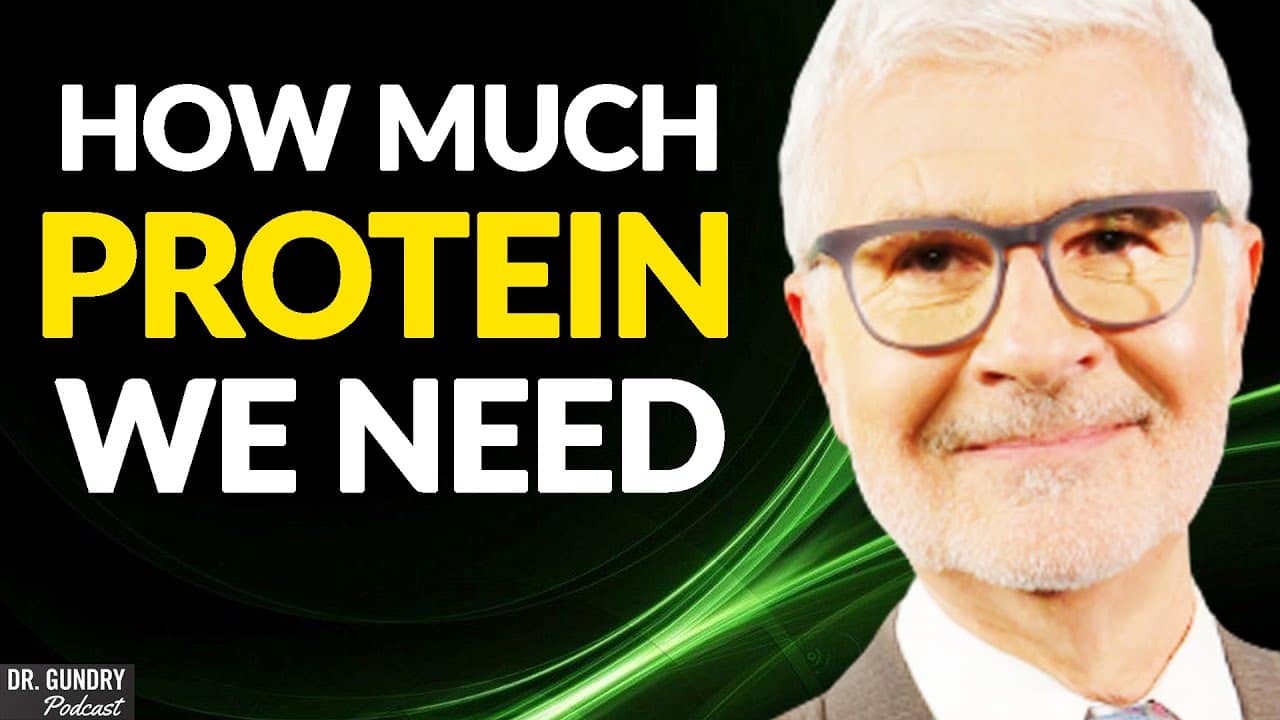The topic of protein intake has gained much attention in recent years. With the rise of health and fitness culture, many people consider protein the essential nutrient to fuel their muscle-building and weight-loss goals. However, as with any nutritional trend, it is essential to delve deeper into the research to understand the potential effects on our health.
One aspect of this discussion that has become increasingly controversial is the role of red meat in our diets. Numerous studies have suggested that red meat, particularly beef, can contribute to cancer and heart disease development. Many health experts advise against consuming red meat entirely, instead recommending alternatives like fish, chicken, or plant-based proteins.
Dr. Gundry, a prominent health expert and host of the Dr. Gundry Podcast, has dedicated many episodes to discussing protein intake and its potential benefits and drawbacks. One of the most fascinating aspects of his research is the idea that our bodies may not require as much protein as we think.
According to Dr. Gundry, research has shown that even elderly individuals can meet their muscle synthesis needs with as little as 30 grams of protein per day. This figure may surprise those who believe they must consume large amounts of protein to build muscle and maintain overall health.
Additionally, Dr. Gundry points out that too much protein, particularly from red meat sources, may be unnecessary and have adverse health effects. While there is debate over whether excessive protein intake can cause kidney damage, Dr. Gundry suggests that consuming too much protein could convert excess protein into sugar, which is then stored as fat in the body.
This is a crucial point to consider, particularly in light of the popularity of high-protein diets like the ketogenic diet. While these diets have shown promise in helping individuals lose weight and improve metabolic health, they often rely heavily on protein sources like beef, which could contribute to weight gain and other health problems over time.
For individuals who consume red meat, it is essential to consider some of the specific health risks associated with this food group. For example, many studies have linked the consumption of red meat to an increased risk of colorectal cancer. Additionally, red meat may contain a sugar molecule called new five gc, which has been suggested to contribute to chronic inflammation and other health problems.
Ultimately, the decision to consume red meat, or any particular protein source, is a personal one that should be based on individual health needs and preferences. However, by considering the latest research on protein intake and its potential effects on our health, we can make more informed choices about what foods we eat.
*****
*****
Summary of Transcript:
In this video, Dr. Gundry discusses the topic of protein in the diet and addresses common questions, such as how much protein is needed and which proteins to eat or avoid. He cites a study that shows that even elderly individuals can still meet their muscle synthesis needs with as little as 30 grams of protein per day and that excess protein is converted into sugar, which is then converted into fat. He also talks about the dangers of consuming too much fructose and how the high protein diet of the late Dr. Atkins may have contributed to his obesity. Additionally, Dr. Gundry notes the presence of a sugar molecule called new five gc in beef, lamb, and pork which he calls a “crazy” molecule.
*****
Summary of Description:
The idea that meat is necessary for building muscle is a misconception, and there are many misconceptions about protein consumption. The podcast episode reveals the truth about protein consumption, including how much protein the body needs, the hidden dangers in meat, and how a vegetarian diet can be the healthiest for building muscle. The episode also discusses the dangers of the Atkins diet, the benefits of cutting calories without cutting calories every day, and the benefits of intermittent fasting.
*****
Source Description
“You need to eat meat to build muscle.”.
It’s something I hear ALL the time.
But the truth is animal protein is NOT all it’s cracked up to be.
And concerning protein consumption in general, there are quite a few misconceptions surrounding this critical nutrient.
So I let you in on the TRUTH about protein consumption in this episode. I’ll reveal the one protein you should always avoid and explain why a vegetarian diet may be the healthiest — EVEN if you want to build big muscles.
In this episode, you’ll learn:
– How much protein your body needs every day (the answer will surprise you)
– Why the creator of the Atkins diet gained so much weight and why the Atkins diet may have the same effect on YOU
– The real reason the “meat-only” carnivore diet works (hint: It’s NOT protein)
– A surprising “hidden danger” in red meat that could harm your health
– Why do the world’s “superfoods” all share this 1 thing in common (and it’s not their diet)
– The 1 weird thing that happens when older people stop eating so much protein
– The truth about “grass-fed” beef (prepare to be SHOCKED)
– How to get the benefits of cutting calories WITHOUT cutting calories every day
– What my “cheat day” actually looks like
– My favorite “on-the-go” protein snack
– My favorite source of protein and how it can “turn on” your longevity genes (it even contains lectins!)
– The “salad solution” for meeting all your body’s protein needs
– The “buggy” benefits of intermittent fasting (plus: The dangers of fasting too long)


